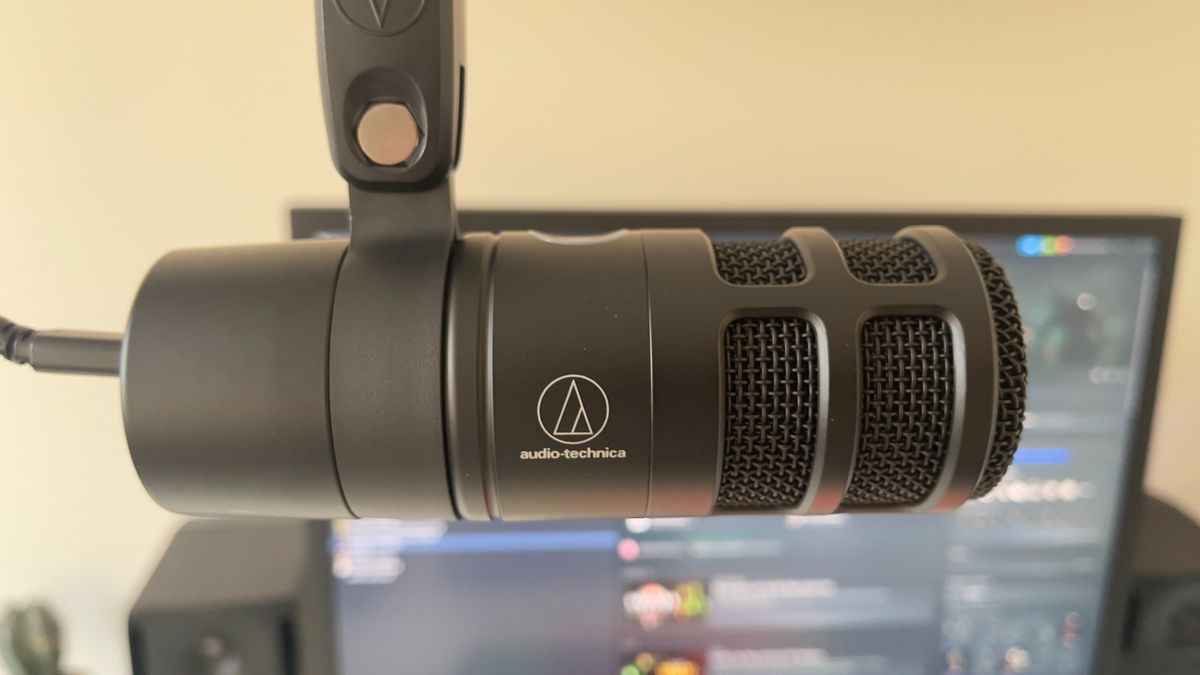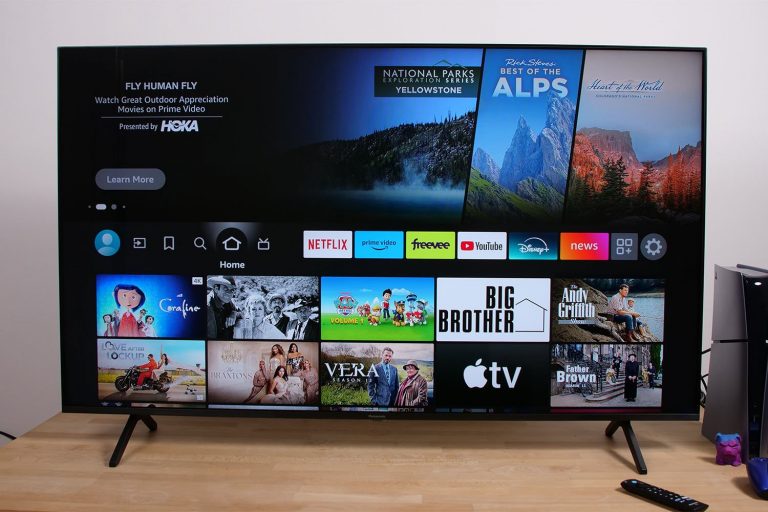It used to be this simple: need a USB mic for gaming? Go and get a Blue Yeti. As recently as five years ago, streaming, podcasting and crisp in-game comms was a relatively unexplored space. In 2024 the latest Yeti is still a strong option, but models like this Audio-Technica AT2040USB show just how much the market’s evolved.
In its build quality and recordings, this is a studio-quality mic that happens to have swapped out its XLR connection for a USB one that doesn’t require an intermediary audio interface between your mic and PC. That’s really the only distinction between the AT2040USB and a traditional studio mic – along with the relatively budget-friendly $149.99 / £129.99 pricing.
What makes this such an enticing option for anyone who streams, records podcasts, does voiceover work, or just wants to treat their friends’ ears in the Discord chat is that the sound quality’s right there out of the box. Its hypercardioid polar pattern means it’s laser-focused on the sound source right in front of it, and tunes out ambient noises like mechanical keyboard clicks or air conditioner hum. There’s a low pass filter control on the mic for an even sharper sound, and that makes it incredibly easy to set up and start recording. Just connect directly to your PC, point and shoot.
The bomb-proof build quality (note: the validity of this statement has not been tested literally) and sophisticated studio looks are a welcome bonus, too.
(Image credit: Future/Phil Iwaniuk)
Audio-Technica AT2040USB: Price and availability
List price: $149.99 / £129.99 (approx. AU$255.50)
Cheaper than the Blue Yeti X and SteelSeries Alias
Great sound and build for the price
This isn’t the outright cheapest option out there. It’s possible to find a great USB mic for under $100 / £100 now, but we think the audio sparkle, ease of setup, and studio-grade build quality on offer in this AT2040USB more than justify what’s still an affordable price. It stacks up favorably against Blue’s flagship Yeti X, although it’s pricier than the base Yeti, and it’s also less than a SteelSeries Alias which also offers great out-of-the-box sound.
Audio-Technica AT2040USB: Specs
Swipe to scroll horizontally
Row 0 – Cell 0 Row 0 – Cell 1
Price
$149 / £129.99 / approx. AU$255
Polar pattern
Hypercardioid
Sample rate
44.1kHz / 48kHz / 88.2kHz / 96kHz
Connection type
USB-C
Weight
1.3lb / 600g
Software
None
Swipe to scroll horizontally
Row 0 – Cell 0 Row 0 – Cell 1 Row 0 – Cell 2
Row 1 – Cell 0 Row 1 – Cell 1 Row 1 – Cell 2
Row 2 – Cell 0 Row 2 – Cell 1 Row 2 – Cell 2
(Image credit: Future/Phil Iwaniuk)
Audio-Technica AT2040USB: Design and features
Studio-like looks Simple to use Direct mic monitoring input
I’m seriously impressed by the construction quality of this capsule for the price – though not entirely surprised, given Audio-Technica’s decades of studio renown. Dynamic mics like this one are a bit less fragile than their condenser cousins, and can usually withstand a few more knocks. That’s why you generally see dynamic mics used for live vocals, for example. The inner workings of the AT2040USB are likely pretty robust, then, which is why it’s all the more impressive that they’re encased in such a sturdy metal case.
No stand or arm is supplied with this mic, so you will need to source either one separately. That’s also something to factor into the pricing since there are cheaper USB mic options out there with a similar feature set which do come with their own stand.
The overall look is refreshingly non-gamer-y, so if you’re looking for something you can sync up to your gaming setup’s RGB scheme you’ll need to look further afield. There is a ring light around a touch-to-mute button to indicate power and mute status, but that’s it. We’re a long way from SteelSeries Alias territory, with its on-capsule lighting displays. Personally I always prefer audio equipment to take its cues from the studio, rather than the world of games. It’s a classic look that ages well and conveys that this piece of kit is serious about its intended purpose.
(Image credit: Future/Phil Iwaniuk)
In terms of on-mic controls, in addition to the USB-C connector, there are some additional features. Volume and monitoring volume scroll wheels sit beneath a low pass filter toggle switch, which is the smallest I’ve ever encountered. So much so that due to the fact it’s also placed in a recessed spot, I actually find it tricky to toggle at times.
Next to the USB-C connection, there’s a 3.5mm input jack for direct mic monitoring, a very handy feature, particularly for anyone with aspirations to use this mic in a musical home recording scenario.
The polar pattern and input type take a lot of the hard work out of the setup. Once the mic’s connected directly to your device, it’s simply a matter of cueing up your recording software of choice and arming a track, or telling Discord that this is your new audio input now. The audio quality’s already there, with essentially no need to bring plugins in.
Given that fact, there’s no supplied software from Audio-Technica for this mic, nor is any such bloatware required. Hooray.
(Image credit: Future/Phil Iwaniuk)
Audio-Technica AT2040USB: Performance
Naturally blocks out unwanted noise Rich, warm vocals Harder to use as an instrument/dual vocal mic
Fundamentally, the sound quality here is one of the AT2040USB ’s most impressive assets. Every decision along its design journey has been made with vocals in mind specifically, from its dynamic capsule to the hypercardioid polar pattern and the tuning of the low cut. As such, you get creamy spoken vocals with plenty of detail that sound almost as if they’ve had some light EQ applied to them. It’s an absolute win for ease of use.
That does mean that this is a very specialist beast, though. While some USB mics offer a choice of polar patterns that might make dual vocal recordings possible (eg two of you recording a podcast together in the same room) and instrumental applications (against an amp speaker or as a room mic for drums or guitar), that’s a lot less possible here. Not a downside, but rather a concession to the AT2040USB being so brilliant at its intended purpose.
In practice, the hypercardioid polar pattern is tuned brilliantly for a home use setting, where passing traffic, keyboard noise and general ambiance from nearby electrical appliances can make recordings noisy and can impact the clarity of your team comms. I usually use a Bertom Denoiser plugin for my voiceover recordings, but before I robotically reached for it and dragged it onto my recorded track, I paused and wondered if there was any point with the AT2040USB ’s recordings.
I’ve got mixed feelings about the touch-to-mute button, though. On one hand, it avoids that ungainly ‘thunk’ sound you sometimes get from mechanical mute switches when you turn the signal on and off, but it’s a little bit fussy and if your fingers are clammy it’s not the most reliable way to mute in an instant.
That’s a tiny issue in what’s otherwise a glowingly positive experience. For podcasting, streaming, and Discord chat this is an absolutely fantastic option with little setup required and very few downsides.
(Image credit: Future/Phil Iwaniuk)
Should you buy the Audio-Technica AT2040USB? Buy it if…
Don’t buy it if…
Also consider
If the AT2040USB isn’t shouting out at you, consider these other USB mic options.
Swipe to scroll horizontally
Row 0 – Cell 0 Row 0 – Cell 1 Row 0 – Cell 2 Row 0 – Cell 3
Row 1 – Cell 0 Audio-Technica AT2040USB
SteelSeries Alias
Rode X XCM50
Price
$149 / £129.99 / approx. AU$255
$179.99 / £179.99 / AU$399
$148 / £170 / AUS$250
Polar pattern
Hypercardioid
Cardioid
Cardioid
Sample rate
44.1kHz / 48kHz / 88.2kHz / 96kHz
48KHz
48KHz
Connection type
USB-C
USB
USB
Weight
1.3lb / 600g
1.65lb / 750g
1.08lb / 489g
Software
None
Sonar
Unify
How I tested the Audio-Technica AT2040USB
Several weeks of professional and personal use Used to record voiceover, in Discord chat, and music projects Somehow never dropped
In addition to the shameful number of hours I spend on Discord shouting at people to clear banana and that ‘T’ spawn needs a flash, I record voiceovers weekly for YouTube content. The AT2040USB took on both responsibilities for several weeks of testing and also went through its paces in music recording scenarios.
Read more about how we test
First reviewed August 2024.







